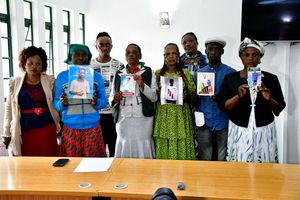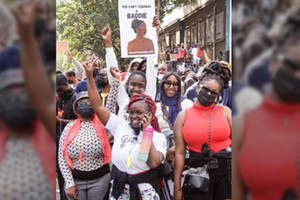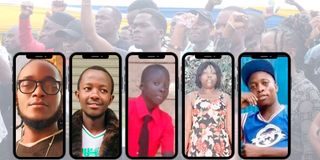
Rex Masai, Erickson Mutisya, Kennedy Onyango, Caroline Shiramba and Benson Mbithi who were killed during the 2024 anti-Finance Bill protests.
One year ago, Kenya witnessed a wave of protests that began with fury over a controversial finance bill. However, it spiralled into tragedy.
More than 60 lives were lost in the chaos that engulfed different cities and towns. The streets, which had once been filled with chants for change, became scenes of mourning. For many families, that moment has been frozen in time: a day that redefined protest; a day that exposed the brutality of the state; a day that left behind unanswered questions that still haunt them.
As the country marks the anniversary of these harrowing events, which reshaped activism and redefined protest, one thing remains painfully clear: justice is still out of reach.
Josinter Anyango knows that pain all too well, having lost her 12-year-old son, Kennedy Onyango, to the protests. She now carries not just grief, but also a heavy mix of broken promises and relentless pursuit of answers.

Michael Ouma and Jacinta Anyango, parents of 12-year-old Kennedy Onyango who was killed during anti-government protests in Rongai, during an interview at their home on May 20, 2025.
Like so many others, Josinter is still waiting for someone to be held accountable. If justice were to take any form, Josinter would only wish for the police officer who killed her innocent son to be apprehended. But she also hopes that the government's promises will be honoured.
“I just want the police officer who shot my son to be named. I want the officer to face the law,” she told the Nation.
President William Ruto said in a TV interview that her son, Kennedy, had died from bullet wounds sustained during the anti-government protests that rocked the country in June last year. She said that the Head of State later reached out to her.
Kennedy had nothing to do with the protests. He had just stepped out to buy a book from a nearby shop and never returned alive.
Nearly a year later, however, she says that the promise has not been fulfilled. Her efforts to seek justice for her beloved son have hit a dead end.

Then there is Rex Masai. He was the first of many to pay the ultimate price in the anti-government protests.
Gillian Munyao, his mother, says that her quest for justice has also been difficult. She says that a number of witnesses who had promised to come forward have since withdrawn, and that the ongoing delays to the inquest are only making matters worse.
“Most of them have withdrawn and we are afraid that with the ongoing delays, we might not be able to get justice for our son,” she says.
Like Rex, Erickson Mutisya was shot during the protests in June 2024. Despite numerous statements being recorded by his mother, Caroline Mutuku Mutisya, she has not yet received any assistance or assurance that justice is being served.

Erickson Mutisya, 26, who was shot at Parliament on June 25, 2024.
“He was my son and every day I recall the morning of the shooting I shed tears. We have gone to the Law Society of Kenya, to the Independent Policing Oversight Authority (Ipoa), but nothing has happened,” she laments.
Tom Mwadime has suffered a similar fate: his brother Kelvin Muasya was shot in Githurai 45 at the height of the protests. The family is distraught and deeply disturbed that justice may never be served for Kelvin.
“My mother is sick and can barely walk. She has sought an audience so that we can get justice, but nothing is forthcoming so far,” he said.
Following the invasion of Parliament, Denzel Omondi, one of the many Kenyans who filmed themselves near Parliament, was found dumped in an abandoned, water-filled quarry.
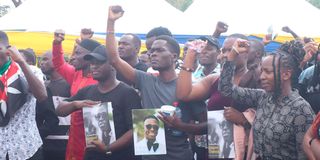
Students from Jomo Kenyatta University of Agriculture and Technology (JKUAT) mourn their colleague Denzel Omondi at his funeral in Rachuonyo North Sub-county in Homa Bay County on July 22, 2024. Denzel died during anti-government protest in Nairobi.
Denzel, the eldest son, was found some 12 kilometres from his residence in Juja. A post-mortem revealed bruising to his knees and the back of his head, and confirmed that he had died from drowning.
“He was still breathing when he was thrown into the water and he died from drowning. We will pursue all possible avenues to establish the truth,” the family lawyer, Apollo Mboya, told the Nation.
Similarly, the life of Edith Wanjiku Kamau was shattered on June 25 last year. Her 19-year-old son, Ibrahim Kamau Wanjiku, was shot and killed. With his death, all her hopes and dreams for his future died too. A year later, the pain remains an open wound.

Edith Wanjiku holds a picture of her son Ibrahim Kamau as she joins youth who were marching to Kenyatta National Hospital in Nairobi on June 30, 2024 to visit their colleagues who were injured by police officers during the anti-Finance Bill 2024 protests.
On that fateful evening, she waited and waited for him to return. He never did. Even now, speaking of him in the past tense feels like a betrayal, she says.
“Ibrahim was such a good person, ambitious and hardworking. He rode a motorcycle to make a living and never let challenges hold him back. He was my baby, quiet and respectful and never one to cause trouble. Losing him feels like losing a piece of myself,” she said.
All Edith wants is for the person who killed her son to be held accountable.
“My son loved leather jackets and every time I see one, I still think it’s him. We talk about him often because accepting that he’s really gone feels impossible,” she says.
Daniel Otieno lost his brother Kelvin Odhiambo on those very streets during the protests in Nairobi. A year later, all he has left are the memories they shared.
“All we want is justice and nothing else. My brother was just 13 years old and was killed in Nairobi Central Business District. Why are they not willing to help us get justice?” Mr Otieno asks.
Joseph Obenge Nyangare is also still wearing the same shoes that pinched his son Charles Osewe Adero's feet when he went out onto the streets on June 25 and never returned. Days later, Mr Nyangare discovered his son’s lifeless body at Mama Lucy Kibaki Funeral Home.
His body bore marks of brutality, evidence of the violent crackdown that had consumed him. On that chaotic day, his friends watched helplessly as police officers descended upon him, beat him, and dragged him away. That was the last time anyone saw him alive.
Joseph, a trained boxer who stands his ground no matter the cost, says his son was more than a protester.
“His bravery might have led him into danger, but he did not deserve this,” his distraught father said.
Eric Kayoni, a 27-year-old student at both the University of Nairobi and KCA University who had recently achieved the highest level of Certified Public Accountant (CPA) certification, was also shot near Parliament that day.

Police officers arrest a relative of the late Evans Kiratu along Kenyatta Avenue in Nairobi on July 25, 2024 during an anti-government protest. Evans was killed by police officers during anti-Finance Bill protests.
Evans Kiratu, aged 21, also died, reportedly after being hit by a tear gas canister fired by a police officer. A year ago, his tearful mother, Ann Wanjiru, pleaded with the government.
“Explain to me and the rest of the parents why you are killing our children,” she says.
In Nairobi, as in Kisumu, the protests turned deadly. In the lakeside city, Benson Mbithi, also known as 'Scot', was reportedly shot by police officers dispersing demonstrators near the Kisumu Bus Terminus. His mother, Penina Mueni, described him as hardworking, sociable, kind, and peaceful.
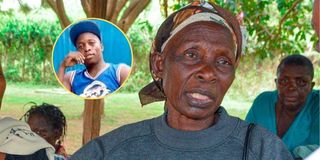
Penina Mueni, mother of Benson Mbithi (inset) at the Jaramogi Teaching and Referral Hospital on June 26, 2024.
In Mombasa, Emmanuel Giggs Tata, aged 20, died after inhaling tear gas.
“Police officers fired teargas canisters from both sides, having cornered us. Giggs could no longer walk after inhaling the fumes. He told me the teargas entered his lungs, and he was struggling to breathe,” his cousin Samson Mwasa Nzamba told Daily Nation last year.
In Kakamega, 35-year-old Caroline Shiramba was going about her daily business of selling groundnuts when chaos broke out. What had started as a peaceful, youth-led demonstration degenerated into running battles. Ms Shiramba was shot in the back while trying to board a matatu to Sigalagala.
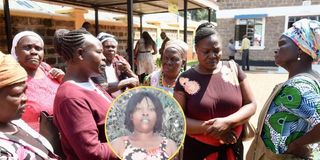
Relatives of Caroline Shiramba outside the Kakamega County General Teaching & Referral Hospital. Ms Shiramba was allegedly shot dead by anti-riot police in Kakamega town during the anti-Finance Bill 2024 protests.
Credo Oyaro would have turned 18 this September. The 17-year-old was killed by a police bullet at the Timbo XO Club in Eldoret during the Gen Z protest. He was a Form Four student at Kapsoya Secondary School in Eldoret and was one of four victims to succumb to gunshot wounds during protests against the controversial Finance Bill.
“Life has never been the same again without him. We deeply miss him and he is always in our hearts,” said Lyn Oyaro, Credo’s cousin. “If he were alive today, he would be playing football. Football was his life, and his dream was to play for big teams. He was an ardent Arsenal fan.”
In their latest report, 'Missing Voices', a consortium of civil society organisations observed that there was a 24 per cent increase in cases of enforced disappearance and police killing in 2024 compared to 2023.
Enforced disappearances increased by 450 per cent, rising from 10 in 2023 to 55 in 2024. However, police-related killings decreased by 12 per cent, dropping from 118 in 2023 to 104 in 2024.
Most cases of extrajudicial killing occurred during the Gen Z protests between June and August. June saw the highest number, with 38 killings, followed by 11 in July and nine in August, bringing the total number of protest-related killings to 58. However, the CSOs estimate that the true figure is at least 60.
- Additional reporting by Titus Ominde.


